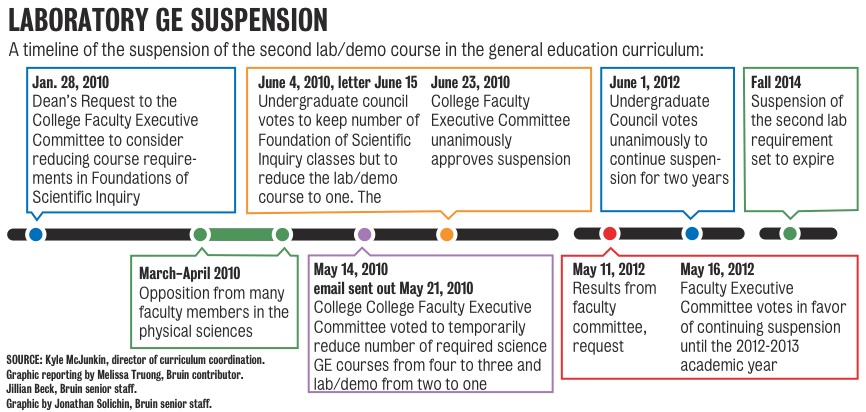Incoming students will still have to complete one laboratory course instead of two for the General Education curriculum, after the Undergraduate Council of the Academic Senate recently voted to extend a two-year suspension on the second requirement.
The extension is in part because the College of Letters and Science needs more time to re-evaluate its approach to science education, said Kyle McJunkin, director of curriculum coordination.
The two-year suspension was meant to be temporary, while faculty used the time to study the course-taking habits of students and re-evaluate the GE curriculum, McJunkin said.
The Foundations of Scientific Inquiry GE requirement currently calls for students to take four classes within the physical sciences and life sciences departments. One of those classes must include a laboratory component.
Before fall 2010, students were required to take two GE science courses with laboratory components. However, the temporary suspension reduced the two laboratory components to one.
The initial suspension, originally proposed by the deans of the College to the Faculty Executive Committee, was set to expire at the end of this quarter. The deans’ request cited budgetary issues that fewer laboratory sections could alleviate and also a lack of space available for the sections. It also proposed that the number of UCLA’s GE science requirements should be more in line with other comparison institutions, among other things.
At its meeting in June, the Undergraduate Council of the Academic Senate voted unanimously to continue to require only one laboratory course the next two academic years, though it did so with great disappointment, said Richard Weiss, chairman of the Undergraduate Council and professor in the chemistry and biochemistry department.
If nothing is done in the next two years, the College will need to decide whether funneling non-science students into a select few classes is the best way to do science education and expand scientific literacy, said Anthony Friscia, a member of the GE Governance Committee and professor in the department of integrative biology and physiology.
Over the last two years, there has been little progress developing new courses with laboratory components or adding labs to existing courses designed for non-science students, said Judith Smith, vice provost and dean for undergraduate education. She added that some progress has been stunted by budgetary concerns.
Funding laboratories is expensive, Smith said. Instead of using money to create new laboratory components, she said the funds could be applied to courses for science students or used to improve current laboratory courses.
Last May, a committee of faculty members released a report on the course-taking habits of students. The committee found that most non-science students completed the life science laboratory requirement with two courses, Life Sciences 1 and Physiological Sciences 5, said Friscia, who was on the committee.
Erika Lopez was one of those students.
Lopez, who recently graduated with a bachelor’s degree in international development studies, said she enrolled in Physiological Sciences 5 to fulfill her Life Science laboratory requirement because she heard it was easy and it was one of the only options available.
If no action is taken to create or expand existing courses to include a laboratory component within the next two years, the College may choose to permanently require only one laboratory course, McJunkin said.
Lopez said she supports the reduction of the laboratory requirement, but would like to see more GEs designed for North Campus students.
Large science departments rarely contribute to the number of “true GE” laboratory courses designed for non-science students, Weiss said. He said this resulted in a fundamental problem of expanding the number of courses available because the departments generally have high enrollments for science pre-major courses and don’t have an incentive to develop more classes.
There are currently no financial incentives for departments to create or modify GEs with a lab component for non-science students, Smith said.
Smith and Weiss said it is up to the faculty to decide how important the laboratory component is, taking it upon themselves to create or modify these courses. They said it is up to the departments to decide if they want to finance and prioritize more GE courses for non-science students.
Friscia said though he recognizes the logistical limitations of having more laboratory and demonstration sections, there is something to be said for a hands-on approach to science.
“There is no better way to learn science than to do it,” he said.
The College Faculty Executive Committee will revisit the issue during the upcoming academic year and ask departments about concrete progress regarding the requirement, Friscia said.
